
Will China save the Classical music industry...? The short answer is: one day, maybe. We know that piano sensation Lang Lang, for example, serves as a role model for 20 million young Chinese piano students. As a result, the instrument has become a status symbol in Chinese households. A similar ripple effect is bound to happen with the next Chinese violin or trumpet sensation. Classical music is also used in Chinese cartoons like the ones with the increasingly popular pig McDull, an endearingly zany character caught in between today's cell phone technology and ancient shadow boxing. McDull captures the confused mindset of the current one-child-only generation. The character's mild goofiness gives the kids a welcome break from the "we need to make up for what the parents lacked" pressure for success, which seems to propel modern China.
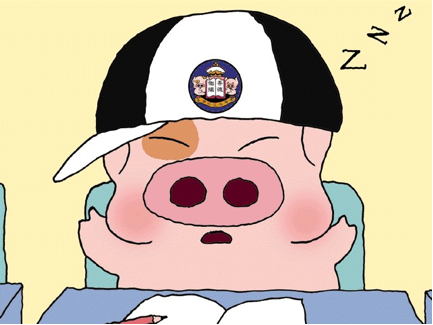
Mc Dull
Emulating Lang Lang can only go so far in terms of creating a sustainable life for the performing arts. And yet, China is building more and more opera and concert halls all over the country. How to fill these often amazing architectural projects with regular audiences and what should be the content when the Cultural Revolution has eradicated any previous Western music traditions altogether? No wonder that today, this country of 1.3 billion inhabitants has only four major symphony orchestras and two patchily functioning opera houses, one of them, the NCPA in Beijing (the "egg"), being more of a walk-through tourist attraction in daytime than a high-profile artistic destination at night. 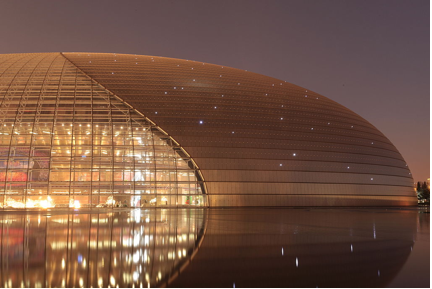
NCPA -- National Center for the Performing Arts, Beijing
If one person can ever connect the dots, it is probably ubiquitous conductor Yu Long, who was trained in Germany and who is currently in charge as music director of three premier Symphony orchestras in Mainland China, as well as three ambitious music festivals, including the Beijing Music Festival. Yu Long seems to have both the energy and the vision to figure out China's future in the performing arts at large. His programming seeks to expose audiences to a wealth of different repertoire, creating subtle two-way connections between Chinese culture and the rest of the world and avoiding dumping Mozart or Brahms on untried audiences in a patronizing way. At the same time, Yu Long clearly refuses to cater crossover trash to a clueless generation. Education is high on his agenda.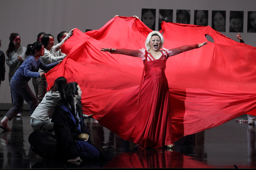
Zhou Long opera Madame White Snake 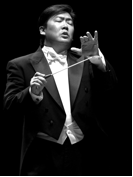
Artistic Director Yu Long
The 13th Beijing Music Festival, which ended on Oct 31, took place in various venues (curiously not at CPA!). It perfectly demonstrated artistic director Yu Long's clever strategy for building cultural bridges. For example, to commemorate the 200th anniversary of Chopin, the Festival officially opened with Lang Lang in a newly commissioned piano concerto by Howard Shore (Lord of the Rings... the Chinese looove blockbuster movies!) Other concerts included repertoire from early Baroque to the John Lennon Song Book, fittingly performed by the Royal Liverpool Philharmonic. 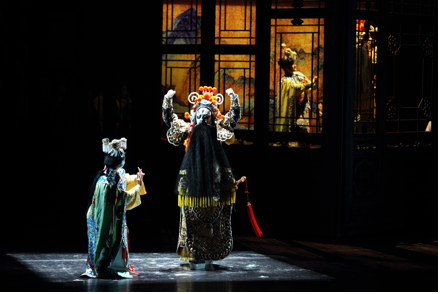
Xiaogang Ye opera Song of Farewell
The Beijing Music Festival also presented three different opera productions in one single week as three different approaches to "Chinese fusion." First, the Chinese premiere of Handel's Semele, in a stunning contemporary visual concept by artist Zhang Huang, followed by Robert Woodruff's contemporary American staging of a new Chinese opera score based on an ancient Chinese legend Madame White Snake. The Festival ended with the world premiere of a newly commissioned opera Song of Farewell (based on movie Farewell My Concubine) by composer Xiaogang Ye in a traditional Chinese staging. The score may sound like a lost-and-found Puccini to a sophisticated opera lover, but, as a project, aside from providing guilty pleasure to Western ears, this was the perfect way to bring Chinese audiences a step closer to "Italian opera". Judging by the success of the evening, the gamble paid off. The public was lapping it up...!
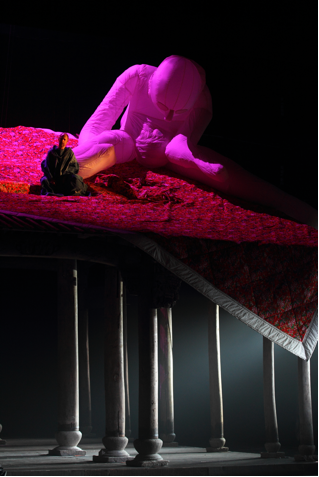
Handel Semele visual concept Zhang Huang
The spectacular Semele production, which deserves to be seen in NYC one day, was initiated and supported by the KT Wong Foundation, also the organizer of the Second Sino-European Summit: "Performing Arts -- a creative future" during the Festival. Top leaders in the performing arts from Paris, London, Berlin and Salzburg sat down with Chinese cultural officials, theater managers and artists to assess the situation in China in terms of Arts education, audience development, theater management and new media. Only to find out that many of the challenges in China are very much the same as the ones in the rest of the world, except that China seems to be addressing the issues head-on in a fearless way. At least so it seems, watching Yu Long.